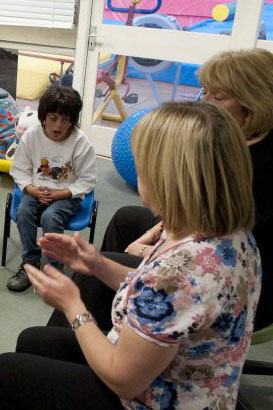
Call and response is a simple way of encouraging
fun communication:
- It relies on the natural poetic rhythm and flow of language;
- It accepts that these rhythms are innate;
- Each line is kept deliberately short and rhythmic;
- It works best when dramatic and conveying feeling and emotion;
- It is naturally and automatically including rather than excluding.
As an example of call and response, read
Alas, Alice, a poem by
Michael Donaghy (1993).
By slightly adapting the poem, this can be 'called', with staff and children
responding by repeating the first phrase of each line. It would start like
this:
Alas, Alice
Who woke to crows
And woke upon the ceiling
And hung there fearing
The evening's sweeping
And looked down now
At unfinished reading
And loved the sleeping
And slept by weeping
And called out once.
The words are beautiful in their rhythm and simplicity,
and convey a deep sense of loss and despair.
What better way to portray sadness?

Grove, N. (2005) Ways into Literature. Stories, Plays and Poems for Pupils with SEN, London: David Fulton.
Grove, N. (2010) The Big Book of Storysharing, London: Senjit.
Grove, N. (ed) (2012) Bringing Literature to Life: Introducing a Range of Approaches for Teachers of Children with Special
Educational Needs, London: Routledge.
Grove, N. and Park, K. (1996) Odyssey Now, London: David Fulton.
Grove, N. and Park, K. (2000) Developing Social Cognition through Literature for People with Learning Disabilities: Macbeth
in Mind, London: Jessica Kingsley.

Park, K. (1998) Dickens for All: Inclusive Approaches to Literature
and Communication with People with Severe and Profound Learning Disabilities,
British Journal of Special Education.
Park, K. (2009) Mother Goose: Developing Language and Communication Skills
through Drama, The SLD Experience.
Park, K. (2010) Interactive Storytelling: Developing Inclusive Stories
for Children and Adults, Bicester: Speechmark.